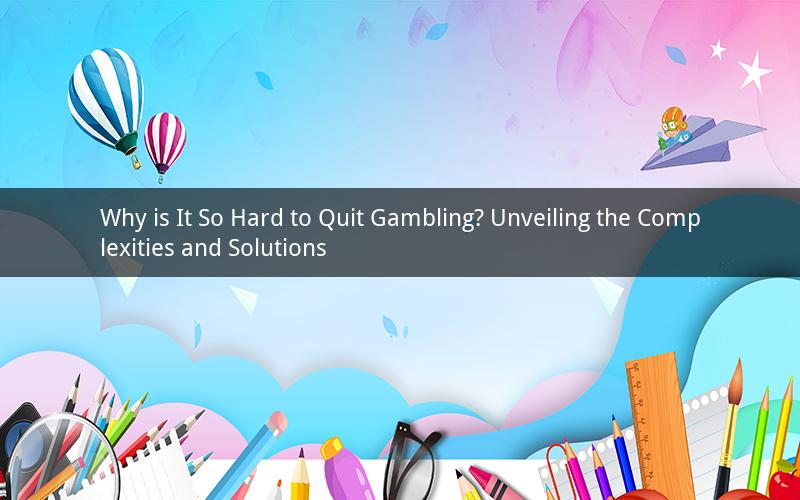
Gambling addiction is a serious issue that affects millions of people worldwide. Many individuals struggle to quit gambling, despite knowing the negative consequences it can have on their lives. This article delves into the reasons behind the difficulty in quitting gambling and explores potential solutions to overcome this addiction.
1. Psychological Factors
One of the primary reasons why it is so hard to quit gambling is due to the psychological factors involved. Here are some key psychological factors that contribute to the difficulty in overcoming gambling addiction:
a. The thrill of taking risks: Gamblers often seek the thrill and excitement that comes with taking risks. The anticipation of winning and the possibility of a big payout can be incredibly addictive.
b. The psychological reinforcement: Many gamblers experience a sense of accomplishment and euphoria when they win. This psychological reinforcement can make it difficult to quit, as they crave that feeling of success.
c. The coping mechanism: For some individuals, gambling serves as a coping mechanism to deal with stress, anxiety, or other emotional issues. Quitting gambling may require finding alternative ways to manage these emotions.
2. Social and Environmental Factors
Social and environmental factors can also play a significant role in making it hard to quit gambling. Here are some key factors to consider:
a. Peer pressure: Individuals who are surrounded by others who gamble may feel pressure to continue participating in order to fit in or maintain relationships.
b. Availability of gambling opportunities: The ease of access to gambling venues and online platforms can make it difficult for individuals to resist the urge to gamble.
c. Marketing and advertising: The aggressive marketing and advertising of gambling can create a desire to participate and win big, making it challenging to resist the temptation.
3. Financial Consequences
The financial consequences of gambling addiction can be devastating. Here are some reasons why the financial aspect makes it hard to quit:
a. Debts: Many individuals accumulate significant debts as a result of gambling. The fear of losing their home, car, or other assets can make it difficult to quit.
b. Financial strain: The financial strain caused by gambling can lead to other issues, such as strained relationships, job loss, and mental health problems. Quitting gambling may seem like an overwhelming task due to the fear of facing these consequences.
4. Relapse and Withdrawal Symptoms
Quitting gambling can trigger withdrawal symptoms and increase the risk of relapse. Here are some factors that contribute to this:
a. Withdrawal symptoms: Individuals may experience symptoms such as anxiety, depression, irritability, and restlessness when they stop gambling. These symptoms can make it challenging to stay committed to quitting.
b. Relapse: Many individuals who try to quit gambling may experience a relapse, which can be discouraging and make it even harder to quit in the future.
5. Treatment and Support
Seeking treatment and support is crucial for overcoming gambling addiction. However, the process can be challenging. Here are some factors that contribute to the difficulty:
a. Stigma: There is still a stigma associated with gambling addiction, which can prevent individuals from seeking help.
b. Lack of resources: Some individuals may not have access to adequate treatment and support services, making it difficult to overcome their addiction.
c. Treatment resistance: Individuals may be resistant to treatment due to denial, fear of failure, or a lack of understanding about the addiction.
FAQs:
1. Q: How long does it take to quit gambling?
A: The time it takes to quit gambling can vary from person to person. Some individuals may be able to quit within a few weeks, while others may require months or even years.
2. Q: Can gambling addiction be cured?
A: While there is no cure for gambling addiction, it can be effectively managed through treatment and support.
3. Q: What are some effective treatments for gambling addiction?
A: Effective treatments for gambling addiction include therapy, support groups, medication, and lifestyle changes.
4. Q: How can I support a loved one who is struggling with gambling addiction?
A: You can support a loved one by offering empathy, understanding, and encouragement. Encourage them to seek professional help and participate in support groups.
5. Q: Can I overcome gambling addiction on my own?
A: While it is possible to overcome gambling addiction on your own, seeking professional help and support groups can significantly improve your chances of success.